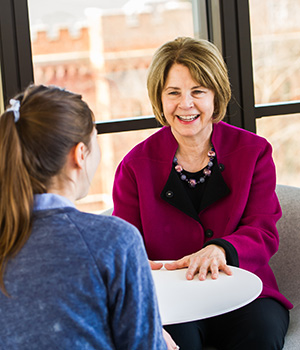
Amy Glasmeier
(she/her)
Urban Studies and Planning
Boosting student resilience
Professor Amy Glasmeier is a truly caring person, which has been demonstrated through both her life’s work and her impact on those she has mentored. Her students describe her as a reliable touchstone in their lives, frequently checking in on their personal and emotional well being, taking them out to lunch or coffee to catch up, and even having students over at her house for dinner. As a mentor, Amy encourages her students to develop their own ideas and forge their own paths, even if those paths differ from hers. She supports her students in these endeavors by giving, as one of her advisees put it, “deep, constructive feedback.”
Amy is exceptionally supportive and understanding of the challenges faced by members of disadvantaged and underrepresented groups. Says one nominator, “Amy’s work often highlights the plights of the most needy and vulnerable in our society, and ways we can improve their treatment and inclusion.” Her well-cited living wage calculator, www.livingwagecalculator@mit.edu, highlights how the minimum wage in many counties across the US is not sufficient to cover the basic needs of the working poor. Amy is also working to understand the social service needs of post-combat veterans and the challenges they encounter in accessing mental health care and other support programs, and has lent some expertise to on-campus efforts to support veterans. Amy takes the time to meet with the student group “DUSP Women” to share her own experiences on the role gender plays in working at a university. Her nominator says Amy is “a valuable voice,” especially as one of a handful of tenured women in DUSP.
Amy Glasmeier is professor of Economic Geography and Regional Planning. She runs LRISA, the lab on Regional Innovation and Spatial Analysis, in the Department of Urban Studies and Planning. Amy is also a founding editor of the Cambridge Journal of Economics. Amy’s research focuses on the spatial interactions of economic actors and structures including firms, industries, institutions and the state in the provision of economic opportunity for communities and individuals. Her work investigates the role of access and the effect of locational accident, which encumbers human development. She is currently writing a textbook on the economic geography of the global energy economy in which she captures the interplay among resources, technology, and state-led development trajectories. Her other project, “Good Bye American Dream,” traces the ideology of opportunity which undergirds America’s relationship to the poor.
Amy is always there to support her students. One student who had “an extremely negative experience on campus” explains that Amy “helped me secure assistance and access institutional resources,” taking time on the weekends and evenings to speak via phone and “help me get back on track.” The student says, “We often talk about students needing to be resilient, but I think what is perhaps sometimes missed is that having supportive, caring faculty like Amy can be the factor that makes the difference.” We thank you Amy for your commitment to support our students and foster their growth.
